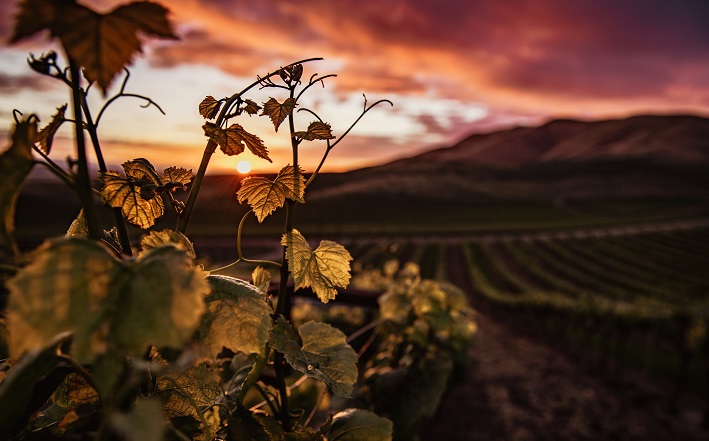Commentary on Psalm 80:7-15
In the spring of the year, some farmers across America can be observed surveying their fields and considering how they will tackle the task of preparing the ground, planting the seeds, and nurturing the crop yet to be born.1
Other farmers rely on computers with GPS technology and a capacity to measure what the soil needs within a square meter. One ponders experience, while the other reflects on the numbers a computer generates. Each method can produce a harvest, but it seems to me that one has a higher degree of intimacy with the rhythms and cycles of nature than the other.
Maybe it is just nostalgic reverie for the days of my youth when I listened to farmers consider the decisions they would make about the processes of farming. Maybe it is an inner longing to join with the Amish in walking behind a plow horse guiding a plow over a patch of ground. And maybe it is something spiritual that inclines my mind and heart toward a tactile embrace of the soil and seeds—an olfactory longing to smell the humus of broken earth as I dig, plant, and trod over it. Whatever it is, there is something of an intimacy within the process of farming that doesn’t exist in the same way as in other professions.
Intimacy is something that develops over time. It doesn’t just appear. I have been married to my wife for over 35 years and we are closer now than when we were first dating. The trials of life—cancer, heart disease, miscarriage, death—coalesce with the triumphs of life—birth, daughters, first bicycle rides, graduations, accomplishments—and together the trials linked with the triumphs mark episodes or places where trust is tested, courage is measured, and hope’s depths are deepened. They represent moments in time where decisions are reached and memories are forged.
One of the curious things about marriage, in my experience, is that it gets better over time. The solace that emerges is unforced. It is something that grows like dandelions in the spring. It cannot be easily removed and everything around it can notice its presence.
In this Psalm the writer takes familiar images and weaves them together into a tapestry of reflections about the present state of the people of God and the seemingly absent God. The timelessness of the Psalm’s poetry lies in part for me in the efforts of the writers to somehow scratch words of truth born from life experience to speak about something that people collectively feel, but may not be able to fully articulate. The poetic flourishes hover over and burrow beneath the layers of experience people carry within them. They traverse spaces between spaces and suggest that the space is as important as the object that marks one end or the other.
Here is a writer faced with a conundrum. The God who is worshiped and adored is somehow missing in action. Where is the God who cared for the people of the past and made their ways clear, thwarted their enemies, and provided for them an abundance of the good things that life can experience? This God seems to be gone from the spaces of human experience. This God is touted as someone who acted in the past and may yet act in the future, but in the present this God is silent, invisible, and potentially impotent. The writer gives voice to what may have been a collective angst that permeated the culture in which the Psalm was written.
Too many hardships, too much anxiety, too many worries, and so on can tip the scales to cause people to wonder about the vitality and presence of God. The current war in Syria is one that can cause one to wonder about the presence of God. When innocent children are gassed with toxic chemicals by their own people a common cry can be discerned, “Where is God?” This refrain could be spoken in almost any global context of great tragedy. Even the small tragedies of life can push people to ponder the actuality of God’s presence and the apparent inactivity of God. One hardship is stacked on another, and they are stacked on yet others, and the person of faith might be driven to ask, “Is this all there is—one bad thing after another—and is God nowhere to be found?”
The Psalmist draws on the collective imagination of people well acquainted with the processes of agricultural life. They know the hard work involved, the hours of anxiety and concern meted toward a field yet to bear fruit. They are cognizant of various forces in nature that can undo the best laid plans and most carefully tended garden. With the smell of dirt in the air and feel of the air on their skin, the Psalmist invites reflection about the action of God as one who works as a vineyard farmer transplanting and nurturing vines to produce good fruit. Perhaps this metaphor works at a variety of levels and the poetry pushes hearers to consider some of those levels.
Farming as a vineyard, livestock, orchard, or row crop farmer isn’t something that requires the same amount of attention everyday. There are seasons for a high degree of activity and there are other seasons in which the vines receive the rain, spread their roots, give forth new shoots, and grow in the sun without contact from the farmer. The farmer is absent, yet the actions of the farmer are still evident. The vine is an apt metaphor for the people of God. The vine grows in relation the stimuli around it. It can be choked by unfavorable influences like weeds. It can be watered too heavily or too little and either rot or starve to death.
The directions at the outset of the Psalm indicate that this is to be sung to a particular tune—a tune that is unknown to us today. Singing the Psalm to your favorite song might be one way to bring the poetry to life. When words invite singing rather than speaking they have a capacity to take flight and soar in our minds like birds on the hot air currents of summer. Singing this Psalm in 4/4 time to the tune of your favorite song could bring a different type of engagement with its world perspectives and perhaps even a degree of intimacy with the ideas presented within it. They might viscerally connect with our own life questions and commingle to craft prayers to God for God to be an active presence in our life.
Notes
- Commentary first published on this site on Oct. 8, 2017.


October 4, 2020